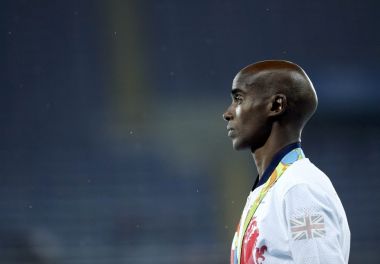Mo Farah reveals he was trafficked - a Christian response

The news that Olympic star Mo Farah was trafficked into Britain and forced to work as a domestic servant has caused shockwaves throughout the country.
The long distance runner revealed he was given the name Mohamed Farah by those who flew him over from Djibouti when he was just nine. His real name is Hussein and he was flown from the East African country by a woman he had never met and then made to look after another family's children, he says.
Mo – whose father had been killed five years earlier – says the lady who trafficked him took a piece of paper off him that had his relatives' contact details and ripped it up.
"If you ever want to see your family again, don't say anything," she told him.
Sadly, this is an all too common tactic of traffickers - and it works. Fear drives children to work hard and to stay silent, in the hope that one day they will see their families again. Sadly, for many, that day never comes.
Mo's story is heartbreaking, yet sadly not that rare. I commend him for speaking out and hopefully now he has, more can be done to bring to justice those who are harming children and inspire more to join the fight against exploitation.
This week I'm flying to Kenya to celebrate a decade of work there. One By One, the charity I started, has worked with many victims of human trafficking and seen hundreds of children rescued and restored over the years.
I remember the fear in the eyes of the two mothers who once approached me in Kenya many years ago asking for help about their missing daughters. One girl had been gone for five months and no one knew where she was. This prompted us to launch the Dignity Project, where we educate children about the dangers of trafficking and abuse, as well as providing girls with reusable sanitary pads to help them stay in school. We have seen more than 21,000 girls go through this programme across the world.
I started One By One after a nine-year-old girl in Sierra Leone assumed I'd bought her flip flops in return for sexual favours. I dread to think what she had gone through in those nine years to think that of another woman.
Fear drives many to take risks they would never willingly choose to take, like taking a job from a stranger in the hopes of receiving food and shelter. On a visit to Nigeria, I once sat with dozens of sex workers who were selling their bodies after promises of a better life failed to materialise.
Poverty, war and desperation create the perfect storm for traffickers who seek out their victims and exploit their loneliness and vulnerability for financial gain.
Whether it's the girl on the streets of Kenya who was told she would be a model if she moved to Nairobi or the girl in Brazil whose own father sold her for sex work, I've seen so many people who have been sold a lie and are suffering. The silence and brokenness only adds to their pain, and not all have the opportunity to speak up and the audience to reach like Sir Mo Farah.
So we must speak up for them. As Christians, we have a duty to defend the marginalised. It's said that 40 million people are affected by modern day slavery and Mo's story proves it's happening on our very doorstep – even in the UK.
Mo Farah was eventually rescued after he opened up to his PE teacher Alan Watkinson, who reported the case to social services, which enabled Mo to be taken in by another family.
Mr Watkinson wasn't a high-ranking politician or a celebrity. He was an ordinary man who saw the need and responded. He opened his eyes to the need in front of him and did something. A few years later one of Britain's best ever athletes was winning gold medals and getting a knighthood.
We can all play our part. Modern day slavery might seem like a giant, but through us joining together we can make a difference. Jesus' entire ministry impacted thousands, but he was often seen spending time with one life. So who can you reach today? Who can you inspire? Who might need rescuing?
Together, we can all make a difference, one by one.
Becky Murray is the founder and CEO of One By One, a charity seeking to end exploitation of the vulnerable worldwide. For more information, visit www.onebyone.net











